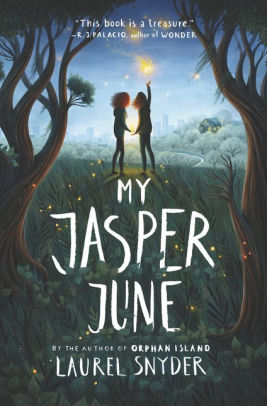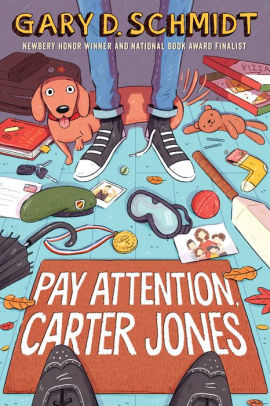The American Library Association Youth Media awards will be announced in two weeks, and you can be sure the conversation is hot and heavy among the Newbery committee members right now. We do our part here at Redeemed Reader by talking over books that may be in that conversational mix. Today, Janie discusses two buzzy titles with a special guest.

Gina Dalfonzo is a writer in Virginia. Her work has appeared in The Atlantic, The Weekly Standard, and Christ and Pop Culture, among others. She is the author of One by One: Welcoming the Singles in Your Church (Baker, 2017), and of the forthcoming Dorothy and Jack: The Transforming Friendship of Dorothy L. Sayers and C.S. Lewis (Baker) and The Gospel in Dickens (Plough).
Janie: Welcome, Gina! Let’s start off with My Jasper June, a novel that scored three starred reviews and a place on many “best of” lists. Two years ago Betsy and I talked about author Laurel Snyder’s Orphan Island, a dreamlike, allegorical novel that also seemed like a strong contender (but didn’t win). My Jasper June is more down-to-earth. Leah, the protagonist, belongs to a nice middle-class Jewish family in Atlanta, makes good grades and has a circle of friends. Then the bottom drops out with the loss of her younger brother, a death Leah feels partially responsible for. It’s changed all her relationships, not just in the family but outside it too. As she reflects,

At home, it was always just . . . home. Dad was a dad and Mom was a mom, and Sam and I were the kids and we did things the way we did things. We knew how to be us.
“We knew how to be us,” and now they don’t know anything, including each other.
The beginning of summer vacation feels both weird and boring, but then Leah encounters a red-headed girl named Jasper. That’s a different name for a girl, but Jasper is a different kind of girl: open, attentive, and unself-conscious. The girls form an immediate attachment, but can friendship really be this easy? Leah’s summer suddenly opens wide, but letting Jasper in means letting in some serious baggage.
One particular strength I found in the book is that Leah’s parents come across as fully rounded characters, as deeply affected by the tragedy as Leah herself and following their own path to recovery. I think you may have had some issues with the parents, Gina? What were they, and what did you see as the strengths of the story?
Gina: As you say, it’s not hard to understand why Leah’s parents are struggling after the loss of their son. But for much of the book, it affects their treatment of Leah in troubling ways. They only seem to care about what she does after she does it, and they make some general gestures in the direction of doing things for her, like helping her come up with summer plans, but never actually get around to doing them. It’s a little disturbing just how completely she’s on her own for a while. Still, the author makes clear that they were once great parents, before this terrible thing happened to them, and that they can be again. So it’s true that they are presented as well-rounded characters, especially in the latter part of the book.
As for the book’s strengths, I found both Leah and Jasper thoughtful, bright, affectionate girls despite their major struggles. Their friendship may be born out of difficult circumstances, but it leads them to a healthier place.
Without giving away too much (I hope!), can you share how you felt about the ending? Was it too easy a solution to Jasper’s problems, or was it a fitting way to close the story?
Janie: Well, it probably wasn’t too realistic, but it’s exactly what I hoped would happen! Still, it involved a rather swift change of mind for Leah’s parents, who haven’t been especially perceptive throughout the story, as you noted. I wasn’t sure it fit with their personalities, but the ending was upbeat and hopeful. I like your observation about the healthier place—we leave the girls with every expectation that the ‘rents are in a healthier place, too. (We should mention that at one point Leah’s mother asks her daughter if the girls are in some kind of romantic relationship. Leah is shocked at the notion–it never even occurred to her. With so many YA, and even MG, novels introducing gay characters–particularly lesbian characters–we’re gratified to hear that. I guess it’s just an indication of the times that Mom had to imagine the possibility.)
Another novel about parent issues is getting some favorable notice this year: Pay Attention, Carter Jones. That attention is great to see because Carter Jones is by one of our favorite authors, Gary Schmidt. Could you start us off with a synopsis, Gina?

Gina: You don’t expect a novel about an American kid to involve an English butler and the game of cricket, but that’s what you get right up front from this wise, witty, and delightful book. As we learn over the course of the story — and the way Schmidt gradually and skillfully unfolds the revelations is one of the best things about it — Carter’s family isn’t just dealing with the normal ups and downs of the life of an Army family with young kids. They’ve suffered a great loss and a terrible betrayal. And to help them cope and begin to heal, they’ve been sent, of all things, a butler. A butler with very proper notions and very high standards, who gives them something to live up to, and even more importantly, who believes in second chances.
Janie, what did you think about the butler’s passion for cricket, his insistence on teaching it to Carter and his friends, and what the game signifies?
Janie: Good question, because Cricket is the controlling metaphor of the whole book. Right off the bat (no pun intended) I’ll advise readers that they don’t have to understand the finer points of the game. I had heard that it’s very complicated, almost on an esoteric/insider level, and this novel bears that out. Every chapter heading is a definition of some Cricket rule or term, and the play-by-play game descriptions can lose a reader who tries to picture the action. So don’t bother—you can get a sense of the play without understanding all the ins and outs. (Although a sports-minded reader, which I am not, may find those descriptions fascinating.)
The reason Cricket is such an effective metaphor is that very characteristic: the rules are complex and involve long-standing tradition, relationships between players, and an underlying sense of honor, all of which take time to learn and develop. They also require attention, to the players and to the game itself. You can’t slack off in left field (like I used to do when playing softball!).
Carter’s life is in disarray when Mr. Bowles-Fitzpatrick (the Butler) shows up. Without giving too much away, the boy’s father has not behaved as a father should, and Dad’s defaults have taken a toll on the entire family. Little by little, the Butler introduces structure and discipline through the medium of Cricket. Life is in one sense a game, and it can’t be well played without observing certain longstanding, established rules. But what makes it fun is paying attention and responding to the variances. I’ve enjoyed reading through the book a second time and noticing (paying attention to!) the ways the author develops his themes. What strikes you about the structure and style, Gina? For instance, how does he use humor to deal with some very serious issues?
Gina: Schmidt has a deft touch with the wry, understated sort of humor an English butler would bring with him. Like so many other things about Mr. Bowles-Fitzpatrick, it fits the situation perfectly. The humor of his early interactions with the family pulls us along through the first part, before we start to learn how broken this family truly is. And it’s part of the overall tone of the book even in those more somber parts, a tone that helps keep things from getting maudlin even as we come to understand the gravity of the situation.
Janie: Schmidt has scored Newbery wins twice for Lizzie Bright and the Buckminster Boy and The Wednesday Wars, both in the honor category. If this is the year he wins gold, we couldn’t be happier.
Don’t miss our profile and interview with Gary Schmidt. You may find a new favorite author!
We are participants in the Amazon LLC affiliate program; purchases you make through affiliate links like the one below may earn us a commission. Read more here.
Support our writers and help keep Redeemed Reader ad-free by joining the Redeemed Reader Fellowship.
Stay Up to Date!
Get the information you need to make wise choices about books for your children and teens.
Our weekly newsletter includes our latest reviews, related links from around the web, a featured book list, book trivia, and more. We never sell your information. You may unsubscribe at any time.
We'd love to hear from you!
Our comments are now limited to our members (both Silver and Golden Key). Members, you just need to log in with your normal log-in credentials!
Not a member yet? You can join the Silver Key ($2.99/month) for a free 2-week trial. Cancel at any time. Find out more about membership here.

